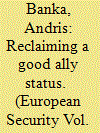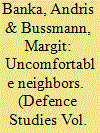|
|
|
Sort Order |
|
|
|
Items / Page
|
|
|
|
|
|
|
| Srl | Item |
| 1 |
ID:
192592


|
|
|
|
|
| Summary/Abstract |
Russia’s invasion of Ukraine has once again reinvigorated the debate about the likelihood of conflict spreading into NATO’s frontline states, namely the Baltic republics. This article argues that somewhat paradoxically, the Baltics currently find themselves in both the best of times and the worst of times. On the one hand, with each “turn of the screw”—Georgia in 2008, Ukraine in 2014 and 2022—Moscow has ensured a greater allied presence across the Baltics. Still, despite this and Russia’s substantial losses incurred in the war, the Baltic lawmakers will not write off Russia as a military threat any time soon.
|
|
|
|
|
|
|
|
|
|
|
|
|
|
|
|
| 2 |
ID:
163251


|
|
|
|
|
| Summary/Abstract |
This article argues that when actors engage in controversial new security practices, it is misconceived to view secrecy as an opposed, counterproductive alternative to the pursuit of legitimation. Rather, we propose, deployment of “quasi-secrecy”—a combination of official secrecy with leaks, selective disclosure, and de facto public awareness—can be an effective strategy for achieving normalization and legitimation while containing the risks entailed by disclosure. We support this claim via a detailed case study of US targeted killing. First, we establish the existence of an American norm against targeted killing during the period 1976–2001. We then detail the process by which an innovation in practice was secretly approved, implemented, became known, and was gradually, partially officially acknowledged. We argue that even if quasi-secrecy was not in this instance a coherently-conceived and deliberately pursued strategy from start to finish, the case provides proof of concept for its potential to be deployed as such.
|
|
|
|
|
|
|
|
|
|
|
|
|
|
|
|
| 3 |
ID:
177995


|
|
|
|
|
| Summary/Abstract |
What are the coping strategies of small states at a time when their great power ally questions its security guarantees? Faced with such a scenario, one strand of the literature proposes that small states will seek to establish a reputation of a “good ally” in the eyes of their security patron, thus reducing the likelihood of abandonment. Others, however, maintain that in times of heightened geopolitical uncertainty, small states will attempt to “hedge their bets” by reducing their reliance upon a capricious great power and pursue strategic realignment. The article tests these theoretical assumptions against NATO’s easternmost members: Estonia, Latvia, and Lithuania and their navigation of the “America First” world. The analysis lends evidence that the Baltics have not sought a strategic reorientation away from Washington. Instead, to guard against the possibility of their patron’s defection, they have strived to gain a loyal and trustworthy partner’s reputation by increasing their defence spending and joining the US on a foreign battlefield. The study concludes that these efforts have been primarily geared towards an audience of one: a NATO-sceptic US President.
|
|
|
|
|
|
|
|
|
|
|
|
|
|
|
|
| 4 |
ID:
189042


|
|
|
|
|
| Summary/Abstract |
The US exit from Afghanistan, together with other geopolitical tremors, prompted commentary suggesting that Washington’s credibility had been badly shredded such that its allies no longer view it as a trustworthy partner. Yet despite such dire assessments, the three Baltic states remain confident that in their hour of need, the US would marshal its armed forces and come to their aid. While for many the phrase “indispensable nation” provokes scorn and eye-rolling, a majority of Estonians, Latvians, and Lithuanians view the US precisely in that light. How do we account for the fact that this part of Europe has proven to have such fertile and resilient soil for pro-American sentiment? What explains the remarkable staying power of this phenomenon?
|
|
|
|
|
|
|
|
|
|
|
|
|
|
|
|
| 5 |
ID:
190099


|
|
|
|
|
| Summary/Abstract |
To what ends do allies employ military exercises? In order to further our understanding regarding the logic and utility of military drills, this paper focuses on NATO’s eastern flank. Specifically, with the help of newly compiled data, we tracked two decades of exercises in the Baltic states. Our analysis speaks to the fact that the size, tempo, and character of military training events in this region have manifestly changed. In the early 2000s, military drills were primarily conceived as a mechanism to modernize Baltic armed forces and ensure their adequacy to NATO membership standards. The 2014 Crimea crises, however, dealt a serious blow to the regional order. This event was the primary driver behind a considerable spike in the overall exercise numbers. At the same time, we observe that it was not only a mere quantitative shift that transpired. From parachute drops into remote areas, rehearsals of river crossings to moving of combat power via narrow land corridors, the staging of military exercises after 2014 were overhauled into events that accentuated NATO’s reinforcement capabilities. In this context, military exercises can be seen as a crucial element to credibly signal capacity and resolve within the concept of deterrence by reinforcement.
|
|
|
|
|
|
|
|
|
|
|
|
|
|
|
|
|
|
|
|
|